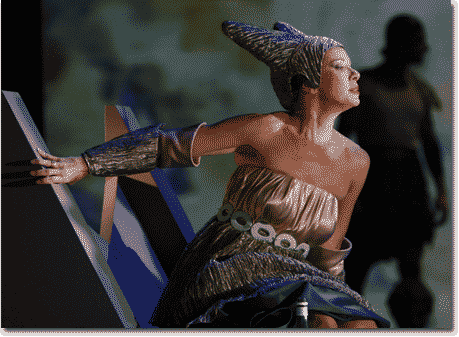Operatic Behavior
Opera! From Chuck Jones’s spin on Wagner to Rent’s take on La Bohème, opera saturates our culture, from the highbrow to the lowbrow. Anyone can give “Ridi, Pagliaccio!” the old college try — but how in the world does someone actually go pro? How does an aspiring opera singer even get started?
Soprano Alizon Hull ’91, whose parents were opera buffs, began by singing in the children’s chorus at the Met when she was about nine years old. “It was a magical introduction to opera,” she says. “I was hooked.” Opera was its own separate world; if she bragged to friends that she’d just been in a show with Luciano Pavarotti and Kiri Te Kanawa, “most people would just shrug,” she says, and ask, “‘Who?
What does one study? Hull was an English major (“Learning to analyze literature is a great gift that you use in your analysis of everything, including opera scores,” she says). Soprano Sharon Azrieli ’81, on the other hand, majored in art history. She studied voice at Vassar, and sang with an a cappella group — though at the time, she says, she “hadn’t yet caught the bug of ‘do this or die’ yet.” But after her junior year, she spent a summer in Florence. “Almost as a fluke, I found myself in a master class with the great baritone Gino Bechi.” She “absolutely fell in love with opera,” she says. “I credit that experience with changing my whole life’s direction.”
Vassar is not a conservatory; nevertheless, “I always felt that it was possible for me to become an opera singer,” says mezzo soprano Fredrika Rhodie Brillembourg ’82, “because I went to Vassar and not somewhere else.” When she was in Poughkeepsie, “there was a strong push for us to be individuals,” a push that included “artistic freedom,” she says. “It was a very open place, and it made me feel free to pursue my love of classical music” — even if none of her friends shared the same interest. Brillembourg was a music major, a member of the Night Owls and the Madrigal Singers, and the host of a classical music show on WVKR. “The feeling at that time,” she says, “was that anything was possible and we were free to discover ourselves.”

Brillembourg in Salome, Bremen Theatre, 2008
Brillembourg got hooked the summer after her freshman year, studying voice at the Aspen Music Festival. During a master class, she says, “I had the realization that I could do as a profession the thing that I loved most, music and singing.” Back in Poughkeepsie, she put together her own operatic crash course: English literature, drama, acting, art history, French, German. “And one wonderful alumna had given a subscription to the Metropolitan Opera to Vassar students,” she says. “All these various things have been a part of my preparation for being an opera singer.” Brillembourg was, for many years, a member of the ensemble at the Bremen Theater, where she sang everything from the lead in Carmen to Marguerite in Berlioz’s Faust.
Continued study — a lifetime of study, even — is clearly crucial. (Between productions, “I still take lessons whenever I can,” Brillembourg says.) After graduating, Azrieli spent a year at the Manhattan School of Music; later, she got into Juilliard (after three auditions — “yes, three years,” she says. “I was so determined!”). Her study at Juilliard, and her work with private voice teachers in New York, were where she really prepared for the life of a professional singer. Azrieli, based in Montreal, recently played Liù in the New Israel Opera’s Turandot; she has also played Juliette in the Canadian Opera Company’s Roméo et Juliette, among many other roles.
Hull also studied at the Manhattan School of Music, where she got her master’s degree. She, her husband Giovanni Reggioli, and their five-year-old daughter, Camilla, now live in Washington, DC. Giovanni is a conductor for the Washington National Opera; Alizon sings in the chorus. They are happy to be relatively settled — ordinarily, an opera career is one spent on the road, Hull says: “You must be resolved to life in a suitcase.”
The life of an opera singer, all agree, is not an easy one. Hull’s boss at the Washington National Opera, Plí¡cido Domingo, has a motto, she says: “If you rest, you rust.” The job “is the hardest place to be on earth!” Azrieli says. “The pressure is enormous, the competition crazy, the expectations so high!” “We live by the fees that we make for our performances,” Brillembourg says, “and we are judged only by our last shows.”
Where does this all leave someone just starting out? Soprano Chinwe Enu ’01 “caught the bug” in the summer of 1996, studying voice at the Boston University Tanglewood Institute. But it wasn’t until 2005, after having finished law school, that she got serious about music. “I realized what my spirit had been telling me for years,” she says — “singing professionally was something I needed to do.” Enu took voice lessons at Vassar, but majored in science, technology, and society. “It took me some time, and my path to the pursuit of an operatic career has been circuitous,” she says, but Vassar helped her realize “that it was okay to pursue a non-traditional path.” Enu is currently working on her second bachelor’s at the University of Maryland — this time in voice.
Goethe famously wished that the stage was narrow as a tightrope, so that the timid wouldn’t dare try walking on it — but maybe the opera is already that daunting? “I’m not sure I would encourage too many others to pursue it,” says Hull — “unless, of course, like any other life, you must.”
